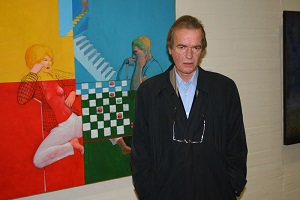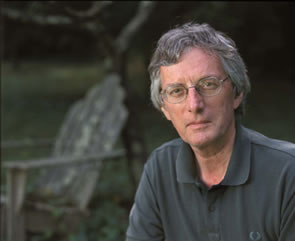De Engelse schrijver Martin Amis werd geboren op 25 augustus 1949 in Cardiff, South Wales. Zie ook alle tags voor Martin Amis op dit blog.
Uit: Lionel Asbo. State of England
« Dear Jennaveieve,
I’m having an affair with an older woman. Shes’ a lady of some sophistication, and makes a refreshing change from the teen agers I know (like Alektra for example, or Chanel.) The sex is fantastic and I think I’m in love. But ther’es one very serious complication and i’ts this; shes’ my Gran!
Desmond Pepperdine (Desmond, Des, Desi), the author of this document, was fifteen and a half. And his handwriting, nowadays, was self-consciously elegant; the letters used to slope backward, but he patiently trained them to slope forward; and when everything was smoothly conjoined he started adding little flourishes (his e was positively ornate—like a w turned on its side). Using the computer he now shared with his uncle, Des had given himself a course on calligraphy, among several other courses.
On the plus-side, the age-difference is surprisingly
He crossed that bit out, and resumed.
It started a fort-night ago when she rang up and said its the plumbing again love. And I said nan? I’ll be right over. She lives in a granny flat under a house about a mile away and theres allways some thing wrong with it’s plumbing. Now I’m no plumber but I learnd a bit from my Uncle George whose in the trade. I sorted it out for her and she said why not stay for a few drink’s?
Calligraphy (and sociology, and anthropology, and psychology), but not yet punctuation. He was a good little speller, Des, but he knew how weak his punctuation was because he had just begun a course on it. And punctuation, he (quite rightly) intuited, was something of an art.
So we had a few Dubonnet’s which I’m not used to, and she was giving me these funny look’s. She’s all ways got the Beatles’ on and she was playing all the slow one’s like Golden Slumber’s, Yester-day, and Sh’es Leaving Home. Then gran says its so hot I’ll just slip in to my night-dress. And she came back in a babydoll!
He was trying to give himself an education—not at Squeers Free, recently singled out, he read in the Diston Gazette, as the worst school in England. But his understanding of the planet and the universe had inconceivable voids in it. He was repeatedly amazed by the tonnage of what he didn’t know.
So we had a few more drink’s, and I was noticing how well preserved she is. She’s taken good care of herself and shes really fit considering the life shes’ led. So after a few more drink’s she says are’nt you frying alive in that blazer? Come over here handsome, and give us a cuddle! Well what could I do. She put her hand on my thigh and slid it up my short’s. Well I’m only human aren’t I? The stereo was playing I Should Of Known Better—but one thing lead to another, and it was mind blowing!”

Martin Amis (Cardiff, 25 augustus 1949)
De Nederlandse dichter Cornelis Jan (Kees) Stip werd geboren in Veenendaal op 25 augustus 1913. Zie ook alle tags voor Kees Stip op dit blog.
Poppenkast
De poppenkast staat midden op de straat.
Vanuit de verte hoor je haar al kijven:
Katrijn, van alle vreselijke wijven
het vreselijkste wijf dat er bestaat.
Maar voor Jan Klaassen zelf staan wij paraat.
Wij zullen trouw zijn kameraden blijven
totdat hij straks in levendigen lijve
de dooie dood van Pierlala verslaat.
’s Nachts is het dorp een poppenkast zo groot
dat alle poppen grote mensen lijken.
Men ziet mijzelf daar als Jan Klaassen prijken.
Maar nauwelijks heb ik de dood morsdood
zijn zelfgegraven graf in laten dalen
of kijk daar staat Katrijn, ze komt me halen.
Op een muis
Een kleine huismuis aan de Maas
hield niet van Nederlandse kaas.
Was het geen Camembert of Brie
dan huilde hij een dag of drie
totdat zijn moeder zei: “Mon cher,
hou op met je gecamemblèr.”
Een egel
Een egel die, gestart te Smilde,
naar Hindelopen lopen wilde,
zeeg halverwege in elkaar
met een aanmerkelijke blaar.
Ach had ik, hoorde men hem snikken,
maar iets om die mee door te prikken.
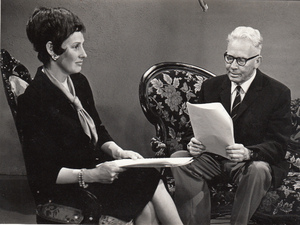
Kees Stip (25 augustus 1913 – 27 juni 2001)
Hier met een heel jonge Mies Bouwman (l)
De Britse schrijver Howard Jacobson werd geboren op 25 augustus 1942 in Manchester. Zie ook alle tags voor Howard Jacobson op dit blog.
Uit: Peeping Tom
“Signs are, even to my drugged eye, that the village is finally coming out of winter. I am not witnessing a return to robustness and sanity exactly -that’s too much to expect down here, so far from the soundness of cities, so deep into the obsessional neurosis of Nature – but there is an atmosphere of fragile convalescence abroad, as if the patients have been allowed their first unaccompanied turn around the walled gardens of the institution. The wind has dropped. The water in the harbour rocks itself, brood-ing on its delusions. The squinting sea birds look as if they believe they might just eat again. Those hoteliers who changed wives or husbands at the start of the off-season – hoteliers are always the most romantic and expectant inhabitants of any remote place – have changed back again and are freshening up their Vacancy notices. Autographed copies of this year’s print run of Lionel Turnbull’s pamphlet (Lance Tourney is, of course, a pen-name) have started to appear in the post office and the village stores, and Lionel himself has begun those naked ritualistic swims which will continue every morning now until the Atlantic freezes over again. And already the first serious walkers of the season have arrived in their fetishistic boots and with their Ordnance Survey maps in protective plastic packets tied around their necks like bibs. I meet them in the early morning during my penitential walks along the harbour walls or out on the cliff paths, and although they all nod me a bracing greeting or wave their blackthorn sticks, I can see that I am an cxtrancity and a blemish for them. In my long sleek-piled fur coat (resembling ocelot and bought on an Austin Reed charge account) and my Bally slip-on snakeskin shoes decorated, rather tastefully I’ve always thought, with a delicate gold chain and having the added advantage of slightly built-up heels, I am not what they have taken a week off work and kissed goodbye to their children and strapped methane stoves to their backs to find. At a stroke I domesticate the cliffs for them.”

Howard Jacobson (Manchester, 25 augustus 1942)
De Amerikaanse dichter Charles Wright werd geboren op 25 augustus 1935 in Pickwick Dam, Tennessee. Zie ook alle tags voor Charles Wright op dit blog.
Bedtime Story
The generator hums like a distant ding an sich.
It’s early evening, and time, like the dog it is,
is hungry for food,
And will be fed, don’t doubt it, will be fed, my small one.
The forest begins to gather its silences in.
The meadow regroups and hunkers down
for its cleft feet.
Something is wringing the rag of sunlight
inexorably out and hanging.
Something is making the reeds bend and cover their heads.
Something is licking the shadows up,
And stringing the blank spaces along, filling them in.
Something is inching its way into our hearts,
scratching its blue nails against the wall there.
Should we let it in?
Should we greet it as it deserves,
Hands on our ears, mouths open?
Or should we bring it a chair to sit on, and offer it meat?
Should we turn on the radio,
should we clap our hands and dance
The Something Dance, the welcoming Something Dance?
I think we should, love, I think we should.
Stone Canyon Nocturne
Ancient of Days, old friend, no one believes you’ll come back.
No one believes in his own life anymore.
The moon, like a dead heart, cold and unstartable, hangs by a thread
At the earth’s edge,
Unfaithful at last, splotching the ferns and the pink shrubs.
In the other world, children undo the knots in their tally strings.
They sing songs, and their fingers blear.
And here, where the swan hums in his socket, where bloodroot
And belladonna insist on our comforting,
Where the fox in the canyon wall empties our hands, ecstatic for more,
Like a bead of clear oil the Healer revolves through the night wind,
Part eye, part tear, unwilling to recognize us.
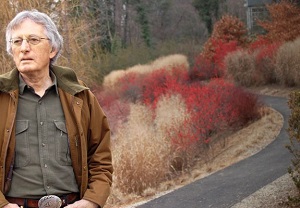
Charles Wright (Pickwick Dam, 25 augustus 1935)
De Duitse schrijver Maxim Biller werd geboren op 25 augustus 1960 in Praag. Zie ook alle tags voor Maxim Biller op dit blog.
Uit: The Mahogany Elephant (Vertaald door Anthea Bell)
“Did you miss me?” he said.
“No, Jordi,” she said. “I didn’t.”
“Of course not,” he said, and nodded.
“Are you angry?”
“No.”
“I’m glad.”
“Good.”
“Are you sure you’re not angry?”
“I’m sure.”
He looked out the window. When she left, he had still been able to see across the square to the Church of Zion. Now the trees were in leaf and all he saw from the window was those wonderful large green leaves. The leaves swayed back and forth in the wind, reminding Jordi of seaweed drifting in the ocean.
Perhaps it was because they hadn’t seen each other for so long. They hadn’t seen each other for almost as long as they’d known each other! He laid his arm on the back of the sofa behind her and left it there for a few minutes, but then he took it away again. The arm didn’t feel quite sure of itself.
“What about you?” she asked.
“Me?”
“What have you been doing?”
“Why didn’t you call?” he said. “Not once in three months!”
“But you knew,” she said, taking alarm. “That was our agreement, wasn’t it?”
She was right. She’d even said, “Suppose I stay there for good?” And he had said that would be O.K., she was a free agent, and if they never said another word to each other again that would be O.K., too. But he had said so only out of calculation, because he knew that she was an Aries—and just try keeping a ram captive.
“There’s a story about that elephant,” she said. She paused, waiting for him to ask what the story was, but all he could think about was how to get the elephant out of the garbage without her noticing.”
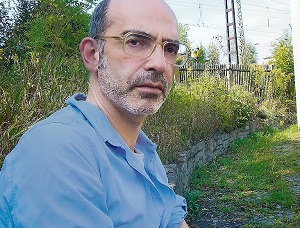
Maxim Biller (Praag, 25 augustus 1960)
De Engelse schrijver Frederick Forsyth werd geboren in Ashford, Kent, op 25 augustus 1938. Zie ook alle tags voor Frederick Forsyth op dit blog.
Uit: De onderhandelaar (Vertaald door Hugo en Nienke Kuipers)
“Maar terwijl hij zijn plicht had gedaan en zijn maarschalksstaf had verdiend, had hij zich ook iets heilig voorgenomen — nooit meer zou zijn dierbare Sovjet-leger zich onder zijn leiding terugtrekken — en ondanks alle manipulatie van de publiciteit was Afghanistan een nederlaag geweest. Het was dan ook het vooruitzicht van een nieuwe nederlaag dat hem zo somber stemde toen hij door het dubbele glas naar de vlagen van ijzel keek die voor zijn raam langs joegen. De oorzaak van zijn somberheid was een rapport op zijn bureau, een rapport dat hij zelf door zijn meest intelligente protégé had laten schrijven, een jonge generaal-majoor die hij uit Afghanistan naar de generale staf had meegenomen. Kaminski was een academicus, een denker en tegelijk een geniale organisator, en de maarschalk had hem tot tweede man op de afdeling Logistiek benoemd. Zoals alle ervaren militairen wist Kozlov heel goed dat je geen veldslagen won met alleen moed of opofferingsgezindheid of zelfs bekwame generaals; je won ze doordat je het juiste materieel — in grote aantallen — op het juiste moment op de juiste plaats had. Als soldaat van achttien had hij moeten toezien hoe de voortreffelijk uitgeruste Duitsers tijdens de Blitzkrieg over de strijdkrachten van het Moederland heen waren gewalst. Hij dacht daar met verbittering aan terug. Het Rode Leger, leeggebloed door Stalins zuiveringen van 1938 en uitgerust met antiek materieel, had geen schijn van kans gehad. Zijn eigen vader was gesneuveld in een poging een onhoudbare positie bij Smolensk te verdedigen. Met repeteergeweren hadden ze het moeten opnemen tegen Guderians daverende pantserregimenten. De volgende keer, had hij gezworen, zouden ze het juiste materieel hebben, en in grote hoeveelheden. Hij had een groot deel van zijn militaire leven aan dat streven gewijd en hij stond nu aan het hoofd van de vijf krijgsmachtonderdelen van de Sovjet-Unie, het leger, de marine, de luchtmacht, de strategische-raketstrijdkrachten en het luchtverdedigingscommando. Dat alles dreigde verslagen te worden. Dat was de eenduidige conclusie van het driehonderd bladzijden tellende rapport dat op zijn bureau lag. Hij had het twee keer doorgenomen, ’s nachts in zijn Spartaans ingerichte appartement aan de Koetoezovski Prospekt en deze morgen opnieuw, in zijn kantoor, waar hij om zeven uur was gearriveerd en meteen de hoorn van de haak had gelegd. Nu wendde hij zich van het raam af, liep terug naar het grote bureau aan het hoofd van de T-vormige vergadertafel en las de laatste bladzijden van het rapport nog eens door.”

Frederick Forsyth (Ashford, 25 augustus 1938)
Zie voor nog meerschrijvers van de 25e augustus ook mijn vorige blog van vandaag.

